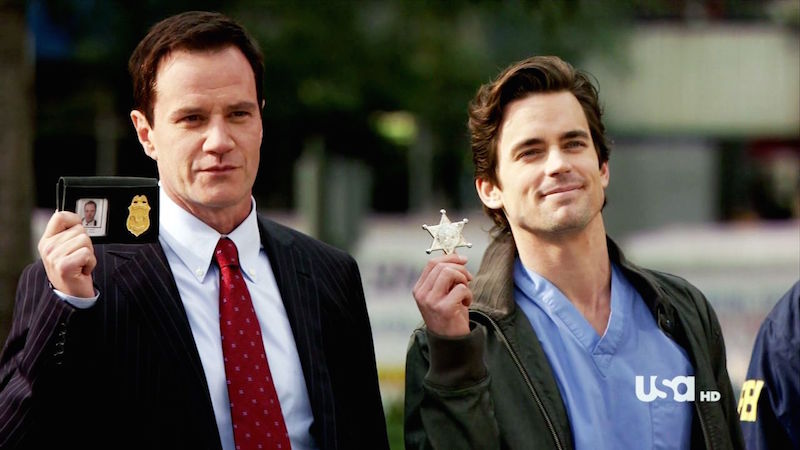On weeknights this summer and now in the fall, when I wind up with the TV all to myself, I routinely settle in to watch White Collar. It is a show that is most effectively watched at a late hour, after the sun has gone down, when you’re alone and the littlest bit sleepy and are eating something warm and indulgent that you are pretending is grander than it is, like last night’s penne alla vodka takeout, or a microwaveable chocolate lava cake that you bought frozen in a box.
I’ve seen all six seasons of the show before, numerous times—the first time as it aired on the USA Network starting in 2009, and several times later. Created by Jeff Eastin, White Collar is a long-running caper snow, which wields a kind of Catch Me If You Can-inspired premise that is very easy to watch and even easier to like. It is about a handsome conman/forger/thief named Neal Caffrey (Matt Bomer) who winds up serving out his prison sentence by solving crimes with the FBI. Neal has been arrested for bond forgery (although suspected of numerous other crimes, including art forgery and theft, money laundering, confidence schemes, and racketeering). And in the pilot episode, he breaks out of prison when he finds out that the woman he loves will no longer wait for him on the other side.
He is caught by uptight, working-class FBI Agent Peter Burke (Tim Dekay), a high-up in the white collar crime division and the very officer who put Neal behind bars in the first place. Slated to redo his entire sentence again, following his return to prison, Neal cooks up a deal that the no-nonsense Peter reluctantly agrees to—for Neal to serve out the remainder of his prison term in FBI custody, using his vast but specialized knowledge to help them catch other white collar criminals. Neal would be a tremendous asset; he can forge nearly anything from Renaissance sculpture to impressionist painting to legal tender in just one night. He can con any mark, pick any lock, crack any safe, diffuse any bomb, fence (stolen goods), fence (with swords), play a mean game of poker, play a meaner game of billiards. He’s a pickpocket and speaks eight languages and knows all there is to know about global art history. To the FBI, he is a Swiss Army knife of criminological potential. But to Peter, he is a petulant wunderkind who needs to learn there are consequences for his actions. But knowing the benefits outweigh the risks, Peter accepts the terms, and becomes his handler.
As they solve crimes together each week, Neal and Peter cultivate a relationship that is sometimes father-and-son and other times Butch-and-Sundance. Once back in civilian life, now sporting a tracking anklet, Neal sweet-talks his way into a living situation better than the Friends apartment, renting a top-floor studio apartment in a Riverside Drive mansion, from an elegant, elderly widow named June (the great Diahann Caroll) who has a soft spot for bad boys and who is happy to lend Neal her late husband’s wardrobe of Devore suits, skinny ties, and fedoras. Neal also reconnects with his longtime grifter pal Mozzie (Willie Garson), a balding and socially-awkward genius who loves conspiracy theories and is anxious about Neal’s now being beholden to the Feds.
But Mozzie’s fears are mostly comical; there is nothing grave afoot in White Collar. It is a blithe, buoyant show, full of the best kind of camaraderie a show can have: being “partners in crime.” As they solve crimes together each week, Neal and Peter cultivate a relationship that is sometimes father-and-son and other times Butch-and-Sundance. Either way, it’s kaleidoscopically ride-or-die, frictional, and very loving. But there are others who assist them in crime-solving and who eventually, collectively form a kind of family; in addition to Mozzie and June, friends can be found in two of Peter’s best agents, the badass Diana Barrigan (Marsha Thomason) and the jovial Clinton Jones (Sharif Atkins), as well as a tough-as-nails insurance investigator named Sara Ellis (Hilarie Burton) and Peter’s very good-natured wife Elizabeth (Tiffani Thiessen).
In this way, White Collar fulfills a kind of entertainment fantasy—sampling, and then playing fast and loose with, the thrills from various crime genres. It smelts Ocean’s Eleven and The Sting, and molds their most fun elements into a detective show format. Exciting thefts and other gripping subterfuges happen in each episode alongside other beloved conventions, from chase narratives and traditional mystery frameworks. And everything is totally, legally sanctioned, somehow. It’s an all-you-can-eat buffet of a television show, a toppling plate of disparate carbs that has eschewed the vegetables of coherence and pacing. Indeed, White Collar is absolute nonsense, a bursting collage of genre’s greatest hits running wild for forty-five minutes per week.
White Collar is absolute nonsense, a collage of genre’s greatest hits running wild for forty-five minutes per week.It’s not a hot take to say a story about con men is itself a kind of a con, but White Collar unequivocally is. It swipes the shiniest prizes from each mode it admires, and leaves the practical parts behind. This accounts for why White Collar seems to jump the shark a lot, or at least float in a realm of stupendous implausibility. The show is 50% daring spectacle and 50% deus ex machina. But it’s fine. Partially because, like all fun cinematic scams, what White Collar lacks in viability or pragmatism, it sure makes up in style.
It even enacts this principle on its most visual level; the show is filmed lushly and luminously on location in New York City, in front of the city’s most divine nooks, however improbable locations they might be in real life (my favorite instance of this is when characters who work in lower Manhattan meet up for a lunchtime walk around the Unisphere all the way out in the Queens fairgrounds). But in this way, White Collar just wants to dazzle its audience, not completely rook them—after all, this show is one of the few that does not try to disguise Toronto or Atlanta or Los Angeles as the Big Apple (although less realistically, the characters drive everywhere in top-line Ford sedans rather than take the subway. But I’m not trying to pick a fight.). Rather like its protagonist, White Collar is a lot of sparkle, but that doesn’t mean it’s shallow. It has a big mushy heart, underneath all the glitz.
At the same time, it’s also not as insightful as it probably should be. White Collar’s premise could have just as easily outfitted a much less rollicking, much less friendly show—for a story that is so much about incarceration and surveillance, White Collar, largely sidesteps the gravity of these topics. The most that White Collar comments about the dehumanization of the prison system, or even the exploitation inherent in Neal’s particular work-release situation, is that it will feature Neal acting frustrated about having his whereabouts constantly accessible to the FBI, or will drop in a bureaucratic bad guy whose threats make Neal’s current deal seem pretty good (a Season 3 plotline involves an agent trying to extend Neal’s sentence indefinitely, to keep mining his skills for the FBI). But more often than not, his tracking anklet is used to save his life. Several times, he uses it to signal to his handlers that something has gone wrong.
Furthermore, mostly because the paternal and rule-following Peter holds the show’s moral hegemony, prison is represented less as an egregious or dehumanizing institution that permits rights violations, and more a center whereby people who have broken the law must pay their debts back to society. Peter doesn’t love the idea of prison, but he does not question it and ultimately sees it as being part of a system of fairness. Never mind that Neal’s agreement with the Feds puts him in a position to trade in his former contacts, or makes him set up and arrest people making the very same choices he once had, and therefore makes him something of a betrayer—but this, too, is glossed over, since those from his former criminal life that he does have to rat out are seen as small casualties in quests to catch much bigger fish. Or they are the big fish.
The ultimate hypocrisy of Neal’s having turned narc is undercut somewhat by this promise that someone as upright and uptight as Peter is behind the badge and gun, and somewhat by Neal’s refusing to color within the FBI’s proscribed lines. There are whole series-long arcs as well as short dalliances in individual episodes, which often involve Neal going behind Peter’s (and the Bureau’s) back to pull off various schemes (some of which him involve him trying to track down his lost love, others of which involve him, say, hoarding Nazi-stolen masterworks rescued from an excavated U-Boat). The thrill of White Collar is that though Neal is now internal to the FBI, he still runs the FBI in circles around him. He co-opts agents his plans and he tricks and manipulates the Bureau, even as he is learning that crime doesn’t pay and that the family Peter offers him is worth making an honest living for.
But he also drags the straight-laced Peter into his life of crime, as much as Peter is willing to go, and the two facilitate stings, cons, heists and other contrivances that are very clever and extremely fun to watch (there are too many nods to the Sting to feasibly count). Neal’s redoing the White Collar division’s approach to justice through legerdemain is extraordinarily successful; together, the men have a 93-94% success rate. But they only hoodwink people who deserve it, a gesture of this FBI’s overall benevolence. Indeed, the FBI agents in this show always do the right thing. They are, like many cool cops on fun TV shows, motivated by helping vulnerable people. And they are absolutely not racist. And if they gaslight or intimidate a criminal, the show justifies it because that person has probably been harvesting human organs from the global south.
Indeed, the biggest way White Collar wiggles away from all insidious associations of systems of capture, punishment, and control is by constructing its own moral universe, one which is ruled by love, fairness, and a quid-pro-quo sense of justice. In White Collar, you get what’s coming to you, yes, but it’s only unpleasant if you deserve it to be. Oddly, White Collar is a show extraordinarily committed to “the little guy.” Its villains-of-the-week are usually-wealthy, mostly-white men who exploit others for monetary gain: crooked hedge fund managers, Wall Street psychopaths, Ponzi scheme architects, criminal masterminds, dangerous gangsters running international crime syndicates, corrupt diplomats, extortionists who target families, etc.
But White Collar‘s other class of villain is another variety of human scum: pretentious assholes of the art world who think they are smarter than everyone else and prove it by stealing stuff for fun. Yes, besides ‘how much a villain has harmed the innocent,’ other metrics for the acceptability of arresting someone in White Collar include ‘smugness’ and ‘pomposity.’ For this, it is an extraordinarily satisfying program to watch. Any fictional law-keeping organization that is committed to nailing the chauvinistic, the elitist, and the egomaniacal, rather than (as in real life) target and disenfranchise the vulnerable, is compelling for me. Additionally, unlike many procedurals of its ilk, this is a show with few murders per season, but killers are also always caught and they all turn out to be assholes; there’s none of that accidental-death-and-cover-up stuff you might remember from other shows. In White Collar, if you’re arrested, it’s probably because you screwed over innocent people.
Indeed, the biggest way White Collar wiggles away from all insidious associations of systems of capture, punishment, and control are through is by constructing its own moral universe…For all its caring about the masses—specifically hard workers living in the shadow of or oppressed by the 1%—White Collar doesn’t bring its Marxist notes to a crescendo. It’s great when Peter and Neal catch financial oppressors and the like, but Neal is one bulky GPS tracker away from doing the same thing, himself. It is critical to understanding White Collar to know that it is not anti-capitalist; though its conmen resist the cogs of traditionally capitalist society and refuse to play by its rules, they ultimately also have the urge to circumvent the rules to accrue the most capital they can. Neal and Mozzie also want to make off with a tremendous score (granted, they do want to do it without hurting anyone or stealing from the savings of the proletariat). They steal from museums not to redistribute formerly-looted artifacts back to their homelands, but to trade in loot for stacks of cash.
On a practical level, are Neal and Mozzie better than the bank robbers, forgers, arts thieves, and counterfeiters that Neal and Peter catch? Um, nope, not really. They’re just our protagonists. And they are exciting because take what they want in a rigid, draconian economic society, and we root for this. Probably, we wish we could do the same. But in doing this, they become the very stockpilers of wealth who make society so hard for everyone else, promoting the fetishizing of capital that so damages our culture. In White Collar, the only thing that keeps Neal and Mozzie from fully turning back to their own ways (most of the time) is Neal’s connection to Peter, who has taken a chance on him and given him a new life. But Neal loves the high life—which itself is absolutely not a crime, though it does reinforce that, in his old ways and sometimes in his current ways, Neal is motivated to steal not by the Robin Hood-esque urge that motivates a similar show from this television era, TNT’s aimless but do-gooding Leverage, but for personal gain.
Ironically, Neal’s service to the FBI and his work with Peter is humanizing for him. He never helps people more than when he’s on a case, working for the Man. This is kind of weird, since the Man violates his privacy and doesn’t seem to pay him (though Neal’s fine with money, always having assets of his own to liquidate when he needs cash—or when the Bureau needs to pay someone’s ransom or buy him into a high-stakes criminal poker game or something). But the point is that to White Collar, Neal’s ultimate police-work is what makes him a better man, a hardworking fellow-worker, an honest citizen, even when he’s running a hustle on the side. Neal is torn between these dual natures until the series finale. Which life will he choose? Even while he assimilates into society, he still refuses to submit to the grind, plotting to serve his own best interests, at the end of the day. What does it indicate about its audience that it’s so fun to watch him try?
This last bit is my own question—White Collar isn’t clever enough to turn the tables on its spectators, and implicate their viewing pleasures in systemic oppression or expose their fantasies of economic dominion. But those thoughts might linger in your mind when you watch it, because White Collar can’t be so smooth as to totally evacuate all of these real-world entanglements in the way The Sting, another cinematic conman fantasy, manages to. White Collar seems to wish it could exist in a vacuum, but it can’t fully pull this off. Still, it plays one hell of a hand. It won’t fool you. It’s not gourmet. But it’ll take you in, and you’ll enjoy it. In my opinion, there are worse rackets to fall for.



















